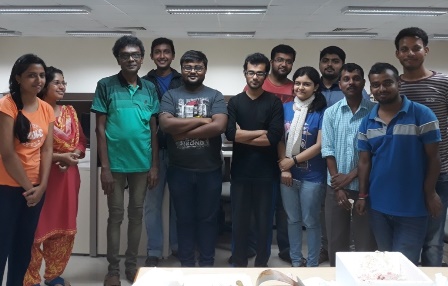Researchers Develop COVID-19 Predictive Model for Decision-making
IIT, Kharagpur, has developed a system that helps in predicting the spread of COVID-19.
In a recent study, the Indian Institute of Technology (IIT), Kharagpur, has developed a system that helps in predicting the spread of COVID-19. This prediction system could immensely help decision-making in health-care, industry, economy, and even academics, say researchers.
This study was led by Professor Abhijit Das from the Department of Computer Science and Engineering at IIT Kharagpur. “The prediction system uses only the daily infection counts available in the public domain without accessing sensitive information pertaining to medical records or contact-tracing data for a large fraction of the population. Despite that, the prediction curves show remarkably good fitting with the past data, and can be used for future planning,” said Professor Das.

Team of researchers at IIT Kharagpur
This system is based on a logistic model, which can be used to fit the available daily counts of infection cases.The data used for the predictions pertain to the entire country, and for the eight most affected states Maharashtra, Tami Nadu, Delhi, Gujarat, Uttar Pradesh, Rajasthan, West Bengal, and Madhya Pradesh.
Prof. Virendra Kumar Tewari, Director, IIT Kharagpur, said, “People have been living in an uncertain black box without the knowledge about which way life is going to turn and how to plan their activities.
A study like this based on a clear statistical model will enable them to understand and plan their way forward. The model though experimental could prove to be helpful in planning our academic semester and policy matters related to the Institute and the campus under the current circumstances.”
However, the predictions for the future change quite rapidly with time. There are several potential factors for this such as different mobility patterns of Indian people in different phases of lockdown, large-scale migration of laborers, change in diagnostic facilities, evolution of the coronavirus, and so on. These are well beyond the control of the logistic model or any other currently known prediction model for that matter.
Also Read : Jobs for Returnee Migrants: Local Self-Governments and Cooperatives Must Lead
Although the implementation fails to generate stable and reliable predictions at the moment, the trend clearly reveals that the disease is going to stay in the country for many more months.
“Our study indicates that India is yet to achieve a steady pattern in the spread of the disease. It is unlikely to get rid of COVID-19 before the end of September 2020,” remarked Prof. Das.
He further added, “This does not leave us in a region of comfort, but the reality has to be accepted, and appropriate plans must be chalked out to address all the issues associated with the outbreak of the pandemic.” (India Science Wire)
